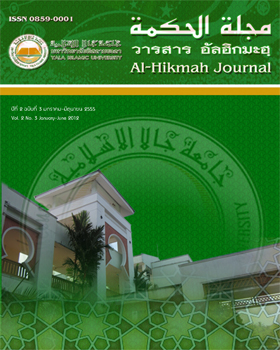The Politics of Ethnic Representation: Malay-Muslims in Southern Thailand and Thai Buddhists in Northern Malaysia
Keywords:
Ethnic Representation, Liberal Leadership and Better Education, Reaction by Dominant PowersAbstract
This study is about the political representation of ethnic minority groups. It’s objective is to examine how ethnic minority groups are represented in their respective parliamentary democratic systems focusing the ethnic Malay-Muslims in southern Thailand and the ethnic Thai Buddhists in northern Malaysia as our field work. This thesis explores qualitatively the political representation of these minority groups using seven independent variables such as liberalization of a system, globalization of communication, styles of leadership, knowledge of religion, better standards of living, better education, and attitude change. And, the dependent variable is “political representation in their community.” It aims to discover some probable values which might be connected with the political representation of these two ethnic groups. The secondary data are from documents concerned and the primary data from our interviews and structured questionnaires that involved 60 respondents: 30 from ethnic Malay-Muslims in Pattani and Narathiwat (southern Thailand) and 30 from ethnic Thai Buddhists in Kelantan and Kedah (northern Malaysia). All the answers from respondents were analyzed in the forms of frequencies and percentages obtained from the relations between independent variables and the dependent variable. The biggest percentage in the results from these seven independent variables will be the most probable value that can clarify the question of how ethnic minority groups are represented in their communities. This study has found that liberal leadership and better education are the most probable values that concern the political representation of the ethnic Malay-Muslims in southern Thailand and the ethnic Thai Buddhists in northern Malaysia. It is also found that the strategy of ethnic minority representation depends on the reactions by the dominant powers towards their ethnic minority groups. It is clearly seen that the Thai Buddhists in northern Malaysia were never supportive of radicalization because Malaysian government has never used forced policies to control the ethnic minority group. Regarding the other variables used in the thesis, the study found that there were obvious differences in the perceptions of the respondents from the two ethnic minority groups studied.
References
Ayoob, Mohammad (ed.). 1981. The politics of Islamic reassertion. London:Croom Helm.
Ayuwattana, Thamrongsak. 2004. Thais in Malaysia. Bangkok: Samnakphim Bannakij.
Bangkok Post. 2001. Problems in the South. 30 September.
Bangkok Post. Muslim militants. Friday, 30 April: 2.
Bangkok Post. Bloodshed, mayhem in South. 27 October:1.
Che Man, W.K. 1983. Muslim elites and politics in southern Thailand. Master’s Thesis, Universiti
Sains Malaysia.
Che Man, W.K. 1990. Muslims Separatism: the Moros of southern Philippines and the Malays of
Southern Thailand.
Hawkesworth, Mary & Kogan, Maurice (eds.). 1996. Encyclopedia of government and politics (2). London: Routledge.
Kibat, Katni Kamsono. 1986. Asas ilmu politik. Selangor: Biroteks, Institut Teknologi Mara.
Huntington, Samuel P. 1991. The third wave: democratization in the late twentieth century. Norman: University of Oklahoma Press.
Magill, Frank N. 1996. International encyclopedia of government and politics, (2) 794-1510. Singapore: Toppan Company Pte.
Manning, D.J. 1971. Liberalism. New York:St. Martin’s Press and London: Dent.
Moolnithi Haji Sulong. 1994. A souvenir for Haji Sulong hospital. Bangkok: Borisat Natcha
Publishing.
Pojjanaworawong, Nakorn & Pojjanaworawong, Ukrit. 1999. Thai history:elections from 1932 and forming governments in all reigns. Bangkok: Thai Wattana Phanit.
Samakom Thai Kelantan. 1998. Resolusi seminar kepimpinan masyarakat Siam Malaysia. Booklet. Kota Bharu: Wat Ariya, Kg. Aril, 11 September.
Smith, Adam. 1950. An inquiry into the nature and causes of the wealth of nations. Edited by Edwin Cannan. 6th ed. London: Menthuen.
Smith, Anthony D. 1981. The ethnic revival. Cambridge: Cambridge University Press.
Suwannathat-Pian, Khobkhua. 1988. Thai-Malay relations: traditional intra-regional relations from the seventeenth to the early twentieth centuries. Singapore: Ocford University Press.
Syed Serajul Islam. 2005. The politics of Islamic identity in Southeast Asia. Singapore: Thomson Learning.
Tohmeena, Den. 1998. New aspiration and Islamic Bank. Bangkok :Muslim News.



